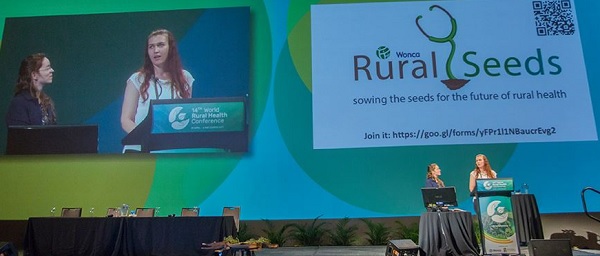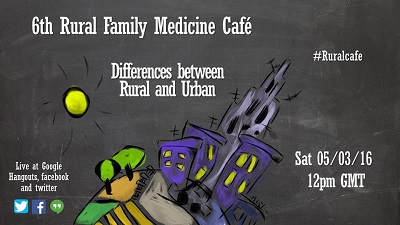Rural Roundup: Veronica Rasic, co-chair of Rural Seeds writes

 Dr Veronika Rasic is a GP Trainee and co-chair of Rural Seeds, a subgroup of the WONCA Working Party on Rural practice for young doctors and medical students with an interest in rural practice. Veronica recently authored a blog entry on the Transformative Education for Health Professionals website an interactive website which also publishes WHO guidelines.The blog entry is reproduced with permission below.
Dr Veronika Rasic is a GP Trainee and co-chair of Rural Seeds, a subgroup of the WONCA Working Party on Rural practice for young doctors and medical students with an interest in rural practice. Veronica recently authored a blog entry on the Transformative Education for Health Professionals website an interactive website which also publishes WHO guidelines.The blog entry is reproduced with permission below. Contact Veronika
[email protected]
Connecting Future Rural Healthcare Workers with Rural Communities
About two years ago I was a young doctor working in Croatia and training in family medicine. As in many areas of the world Croatia is country that is experiencing a lack of doctors and is struggling to retain its health workforce. This problem is felt most strongly in rural communities. Due to these pressures I found myself working in one such small rural community because there was a doctor shortage in the area. This meant that my family medicine training was put on hold and I was asked to relocate to provide primary healthcare for this community. The move was supposed to be temporary while they attempted to recruit doctors for the area. As the months went by it became clear that they would not be able to recruit new doctors. During my time there two other doctors left their posts.
There was no other doctor nearby to provide support, emergency services where stretched over a large area and there was a lack of equipment and other infrastructure in the area. This lead to me often feeling overwhelmed and struggling to cope with the healthcare needs of the community. I realised that after six months I was starting to feel the signs of burnout and was not being provided support regarding my continuing training. I made the difficult decision to leave that situation and restart my training in another country. In so doing I left a rural community without access to primary healthcare.
This story is one that seems to repeat it’s self all over the world.
UN Sustainable Development Goal 3: Ensure healthy lives and promote well-being for all at all ages.
One of the major obstacles to achieving this goal will be the global rural communities which, in all parts of the world, have less access to healthcare. This lack of access is caused by multiple factors i.e. poor infrastructure, shortage of healthcare workers, distance from urban centres, and socio-economic disparities. To tackle this goal we will have to also take on other SDG such as reducing inequalities, clean water and sanitation, no poverty and zero hunger, just to name a few that have a direct impact on health and well-being.
WHO Global Strategy on HRH 2030 states the following principles:
• Promote the right to the enjoyment of the highest attainable standard of health
• Provide integrated, people-centred health services devoid of stigma and discrimination
• Foster empowered and engaged communities
• Uphold the personal, employment and professional rights of all health workers, including safe and decent working environments and freedom from all kinds of discrimination, coercion and violence
• Eliminate gender-based violence, discrimination and harassment
• Promote international collaboration and solidarity in alignment with national priorities
• Ensure ethical recruitment practices in conformity with the provisions of the WHO Global Code of Practice on the International Recruitment of Health Personnel
• Mobilize and sustain political and financial commitment and foster inclusiveness and collaboration across sectors and constituencies
• Promote innovation and the use of evidence
Many of the issues mentioned above contribute to the difficulty of retaining the healthcare workforce in rural areas. It is important for professionals considering a career in a rural area to feel that they will have the same opportunities and support as in urban areas. Rural communities often have increased levels of poverty, domestic violence and discrimination as well as other social determinants that affect their health. To improve the health outcomes in these communities it is important that there be political will to make changes and investments that will facilitate that improvement.
How can we start to achieve positive health outcomes in rural communities?
During the 4th WHO Global Forum on Human Resources for Health we held a Rural Family Medicine Café about the future rural healthcare workforce. These where the outcomes of that discussion on what we could do to improve health outcomes in rural communities:
1. Early exposure of students to primary care and rural medicine
2. Education of healthcare workers in rural areas
3. Recruitment and retention of the healthcare workforce in rural communities
4. Engaging with the community and respecting local customs and traditions
5. Supporting rural healthcare workers with continuing professional development
6. Investing in rural communities
Rural Seeds – bringing together future rural healthcare workers
Rural Seeds brings together students and young professionals interested in rural health. It aims to help identify rural healthcare needs of communities in different regions of the world and facilitate discussion and change to help improve health outcomes for rural and remote communities. The WONCA Working Party on Rural Practice provides support in way of mentorship and access to rural health experts.
In Cairns, at the WONCA World Rural Health Conference, Rural Seeds published a Call to Action. It focuses on three main areas: Education and Training, Communication and Co-Empowerment. (
see presentation)

The current projects that are active are:
-
Rural Family Medicine Café this is an online meeting that discusses rural topics on multiple online platforms using the hashtag #ruralcafe
-
Rural Health Success Stories
- Mentor – Mentee Pilot
To join Rural Seeds please
fill out the following form:
Email:
[email protected]
Extra links for rural seeds, Rural family medicine café and rural health success stories in the blog -
Link to blog
Transformative Education for Health Professionals - WHO Education Guidelines
visit site
The website receives over 6000 visits / month, and is steadily increasing.
Thematic areas are Students; transforming health workforce education for the future; Social determinants of health; eLearning / ICT for Health; Interprofessional education; Community based and health systems education; Social accountability; Civil society suggestions
Dr Julian Fisher is happy to receive blog submissions or
case studies from WONCA members – email him on
[email protected]
WHO Disclaimer
This interactive ePlatform presents the World Health Organization (WHO) Guidelines on Transforming and scaling up health professionals' education and training and related information as part of WHO's implementation and support of the 2013 World Health Assembly resolution "transforming health workforce education in support of universal health coverage".
This ePlatform is maintained and hosted by the Hannover Medical School pursuant to an agreement with the World Health Organization, as part of WHO's Health Workforce Education program.
The statements, designations, and information included on this ePlatform, including, without limitation, statements made by external parties in the in the "blog" and in related "social media" areas, do not necessarily represent the views of WHO. The published material is being distributed without warranty of any kind, either expressed or implied. The responsibility for the interpretation and use of the material lies with the reader. In no event shall WHO be liable for damages arising from its use.
Impressum
Peter L. Reichertz Institute for Medical Informatics
University of Braunschweig – Institute of Technology and
Hannover Medical School
Project management:
Julian Fisher
Hannover Medical School
Carl-Neuberg-Str. 1
30625 Hannover, Germany
[email protected]
Telefon: +49 (0) 511 532 4933